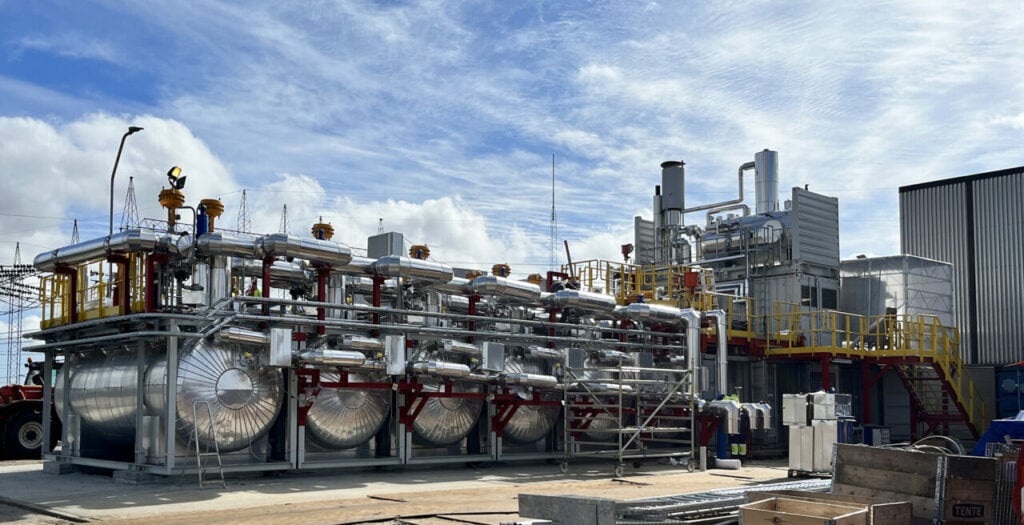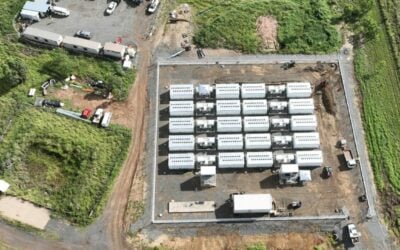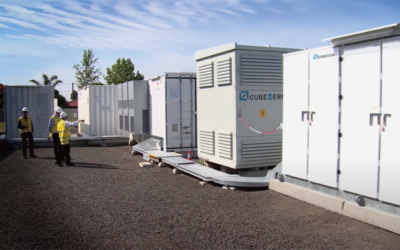
A roundup of news in brief from around the world in energy storage.
Honeywell launches modular BESS for commercial and industrial
Engineering and automation company Honeywell has launched its newest battery storage product, aimed at the commercial and industrial (C&I) market segment.
Enjoy 12 months of exclusive analysis
- Regular insight and analysis of the industry’s biggest developments
- In-depth interviews with the industry’s leading figures
- Annual digital subscription to the PV Tech Power journal
- Discounts on Solar Media’s portfolio of events, in-person and virtual
Or continue reading this article for free
The US-headquartered company this week announced Honeywell Ionic, which combines compact battery energy storage system (BESS) technology with the company’s own energy management system (EMS), Experion Energy Control System.
The solution can be scaled up to very large sizes, starting from 700kWh to 300MWh capacity within its standard configuration, while being designed for its units to be handled with just a standard forklift.
The lithium-ion BESS product also comes with an integrated chemistry agnostic battery management system (BMS), with Honeywell claiming the BMS offers three layers of protection to ensure battery health and safe operation. It can also be combined with Li-ion Tamer, the safety solution produced by Honeywell subsidiary Xtralis.
It uses liquid cooling and comes with 1500Vdc battery stack, while it also offers augmentation support for DC-coupling applications, and its modular design allows for more battery capacity to be added after initial installation. Its main intended applications include peak shaving, onsite energy use optimisation, while it can also be integrated into virtual power plant (VPP) applications.
Wärtsilä BESS meets NFPA 69 fire safety standard
Wärtsilä’s GridSolv Quantum lithium-ion BESS solution for large-scale applications has been tested and certified to NFPA 69, the ‘Standard on Explosion Prevention Systems’.
The standard is from the National Fire Protection Association (NFPA), which is based in the US, but many of the organisation’s standards become used as reference or adopted in other regions, most notably NFPA 855 (‘Standard for the Installation of Stationary Energy Storage Systems’).
Within the US, the standards are among those commonly looked at by authorities having jurisdiction (AHJs) and other stakeholders.
The energy storage arm of the Finnish power and marine sector energy tech company first carried out computational fluid dynamics modelling of various gas dispersion models and then put those to real-world tests.
As with its recent other work in fire safety, where the company put GridSolv Quantum through large-scale fire testing to UL9540A and went beyond its requirements to what the company called “worst-case scenario” tests, Wärtsilä said the test regime it carried out, entailing 25 tests over a six month period, went beyond the requirements of the standard.
Third-party tests conducted by Fire and Risk Alliance found that all flammable gas in the BESS enclosure was exhausted, the lower explosive limit was kept below 25%. Explosion and deflagration were also prevented, with the solution’s venting system working effectively.
Additionally, the company has just released a new customisable Addressable Fire Alarm system for battery storage.
Iberdrola invests in thermal energy storage startup
Iberdrola has invested €3 million (US$3.26 million) in a stake in Kyoto Group, a Norway-headquartered thermal energy storage startup.
Kyoto produces a modular thermal storage unit called Heatcube. Inside, salt is heated up to 415°C, then used to produce steam for industrial processes, although it can be configured to go up to 525°C. Heat accounts for more than 50% of industrial energy demand.
Iberdrola’s investment and coming on board as a business partner to the startup through the Spanish energy company’s startup investment programme gives it 12.8% control of capital. Iberdrola will also nominate a Kyoto director.
Iberdrola’s head of industrial decarbonisation, Fernando Mateo, described energy storage as “one of the major challenges in the energy transition, … hence this collaboration with the Norwegian group will be key to our strategy,” for decarbonisation through electrification,” Mateo said.
Thermal energy management company Spirax-Sacco will also make an undisclosed investment in the company.
“Beyond the capital increase, the fact that both Iberdrola and Spirax-Sarco are vesting their plans, market access and credibility behind the commercialisation of Heatcube, opens up huge market opportunities and provides us with world-class technological support,” Kyoto Group CEO Camilla Nilsson said.
“We are already working on a number of customer-specific commercial projects with Iberdrola and expect to see positive results shortly.”
In October last year, Kyoto Group signed a letter of intent (LOI) to deploy an 88MWh Heatcube system in Spain, with an unnamed company described at the time as “one of the largest owners of cogeneration facilities in Spain”. This led to some speculation the customer could be Iberdrola, which is among the country’s owners of large cogeneration facilities.






